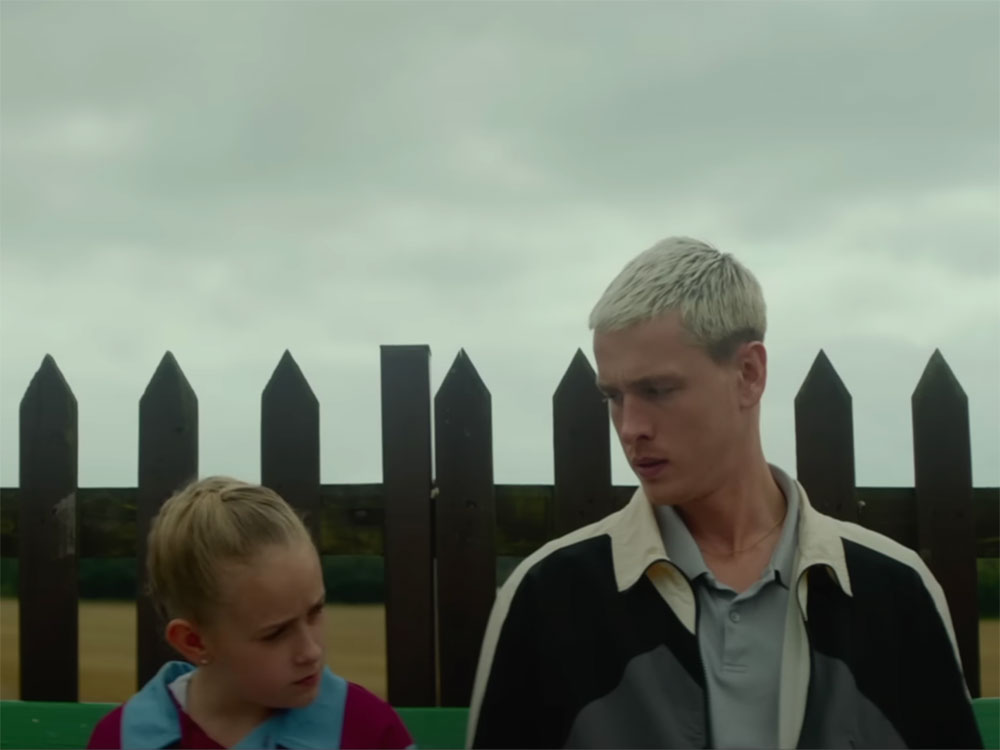Kids these days. Turns out they’re a pretty capable bunch. At least that’s the case with 12-year-old girl named Georgie in Scrapper, director Charlotte Regan’s sweetly sad, British drama that was awarded the Grand Jury Prize at the Sundance Film Festival. The film has garnered acclaim from both critics and audiences alike. And it’s not hard to see why: it’s a charmer with more than a few spikey bits to add some teeth to the story.
After the death of her mother from cancer, Georgie (Lola Campbell) has been living on her own, fooling almost all of the so-called responsible adults around her. She’s managed to keep social services and the school authorities at bay. In the service of maintaining appearances, Georgie is also paying the rent, doing the vacuuming and washing up, buying groceries, as well maintaining a steady income by nicking and reselling bikes with her mate Ali (Alin Uzun).
When they’re not stealing stuff, the kids spend their time shooting the shit, making up new dance moves, and eating chips and gravy at the local café. Ali is the only person who knows Georgie’s secret, but there are things that even he is unaware of. On the inside, things are not nearly as okay as this feisty girl would have people believe. Georgie keeps a certain room in her house carefully padlocked shut; it holds a secret that she keeps from everyone.
Life stumbles on until one day, when the kids are flaked out watching television, a blond guy in a tracksuit hops the back-garden fence.
It’s none other than Jason (Harris Dickinson), Georgie’s erstwhile father. Having fled to Ibiza when Georgie was baby, he’s back after 12 years to offer some sort of parenting. In his fading bleach job and thorough understanding of how to ditch the cops and pick locks, as well the single bullet in his jacket pocket, there are more than a few indications that Jason isn’t entirely a stand-up citizen. Naturally, Georgie has a few reservations, although her friend Ali folds immediately underneath Jason’s blokeish charm.
The bulk of the film is a slow dance, full of feints and parries as father and daughter come to discover how much they truly share. Whether they’ll make a proper go of things and find a way to make a family is the big question at the heart of this tough little chippy of a film.
A brief history of the ‘kitchen sink’
The film pulls from a long tradition of cinematic depictions of poverty-stricken England. Think The Full Monty, Billy Elliot, and even further back to Hayley Mills and Hywel Bennett in The Family Way. Tony Richardson’s A Taste of Honey, a benchmark of the form, is screening at the Vancity Theatre on Sept. 11.
Termed “kitchen sink movies” for their emphasis on the domestic, these British films charted the travails of folks struggling with poverty, pain and often a profound dearth of hope. Many remarkable filmmakers such as Ken Loach, Mike Leigh and Lynne Ramsay have taken up the “kitchen sink” banner and created remarkable work.
In this sense, the story in Scrapper feels deeply familiar. But why are things always so bleak? I’m not exactly sure. In the first batch of “kitchen sink” movies, you could blame the postwar malaise. In the ‘80s, it was the Thatcher years, and now in post-Brexit times, it’s the same old story all over again. Institutions are failing. People are hurting. And the social services network, in place to help people like Georgie, are paying so little attention that they fail to notice that her purported uncle who is supposed to be looking after her is called Winston Churchill.
If the flavour of national cinema could be winnowed down to a few distinct tastes, many British movies would be soggy chips, lumpen gravy, leavened by endless cups of milky sweet tea. This isn’t disparaging this style of film, and in the case of Leigh and Loach, there is a class consciousness at work that is rare in mainstream cinema.
There are hints of this greater understanding of ongoing inequity in Scrapper.
Georgie’s insistence on making her own way, despite her grief and young age, speak to a generational experience of kids growing up in a world where the older institutions are failing. School, social services and almost all the adults aren’t of much use. So, it’s little wonder that the kids are on their own.
Tenderness, but put a hold on the twee
Regan has two considerable performers in Dickinson and Campbell. As wayward father and tough-talking preteen, the pair spark genuine pathos in what could have been a relatively straightforward drama. But the tenderness at the heart of the story is undercut by a few strange directorial choices, namely an insistence of cuteness and twee stuff that feels a little imposed.
This wobbly tone is most clear at the film’s outset. One moment, it’s grimness all ‘round. In the next breath, surreal conceits take over in a series of Greek choruses of talking spiders, bored social workers and neighbourhood kids, including a girl gang in matchy-matchy pink outfits and three triplets astride bikes opining on Georgie’s mental health. This is more than a bit whiplash inducing. Thankfully, the overt silliness falls away through the bulk of the story, although it stages a late comeback.
There’s nothing wrong with a wee bit ‘o levity, but it fits awkwardly alongside some of the harsher aspects of the story. The naturalistic exchanges between father and daughter as they come to know each other better are more than enough, and it sometimes feels that Regan is overstuffing the pudding. This is understandable for a younger filmmaker, but it will be interesting to see where she goes next.
By the time the film’s resolution arrives, it’s hard not to want some small bit of happiness for the father-daughter pair. Is that so much to ask? I don’t think so. Tea and a biscuit would also be nice.
‘Scrapper’ is playing at VIFF’s Vancity Theatre until Sept. 7. ![]()
Read more: Rights + Justice, Film

















Tyee Commenting Guidelines
Comments that violate guidelines risk being deleted, and violations may result in a temporary or permanent user ban. Maintain the spirit of good conversation to stay in the discussion and be patient with moderators. Comments are reviewed regularly but not in real time.
Do:
Do not: